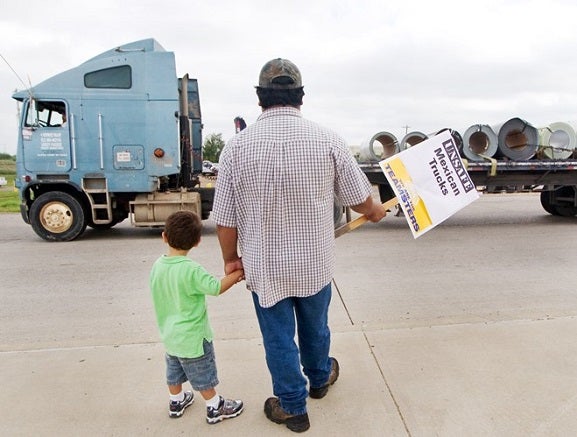Uncategorized
NAFTA 2.0 Must Put Workers First

The renegotiation of NAFTA is finally heating up, with the first round of talks set to be held next month in the nation’s capital. But there is a lot to be sorted out before any new deal can be struck.
The Teamsters have real concerns about what a new North American trade pact will look like. And the White House’s release of its “Summary of Objectives for the NAFTA Renegotiation” earlier this week did little to assuage the union’s doubts.
“I am disappointed that the latest version of the administration’s goals for a NAFTA replacement is not more specific,” Teamsters General President Jim Hoffa said. “The very general outline that the USTR posted on its website suggests that the Trump trade reform team is still undecided about what new trade policy model will replace the old NAFTA and its expansion in other bad deals like the Trans-Pacific Partnership.”
Hoffa took to the airwaves this week to stress the need to put American workers first. “We’ve lost over a million jobs, and we’ve got to start getting those jobs back,” he told Fox Business News’ Maria Bartiromo. “We’ve got to have a fair trade agreement. We’ve got to have one that has content with regards to automobiles built there. We want to have more jobs back here.”
The White House has made it clear that it agrees that NAFTA has been a disaster for American manufacturing and workers. But as it stands, there is nothing in these USTR guidelines for renegotiation that point towards the dramatic overhaul that NAFTA needs.
For example, while the Teamsters agree with the administration that a modernized NAFTA must include new chapters that protect labor rights and prohibit currency manipulation, the union is concerned, based on these new negotiating objectives, that the USTR won’t take strong and specific language to the table when the talks start Aug. 16.
This outline raises more questions than it answers about U.S. priorities going into NAFTA renegotiation. The priorities for the Teamsters, our U.S. and Canadian members alike, include removing the worst provisions, like the outdated and controversial ‘investor-state dispute settlement’ regime in the investment chapter, the government procurement provisions that undermine Buy American, and the cross-border trucking provisions that threaten highway safety.
Hoffa said he will work with the USTR in support of a fair trade agenda and a new NAFTA that is superior to the TPP and finally works for U.S. manufacturers and workers. That is the only way to make sure hardworking Americans prevail under a revamped trade deal.